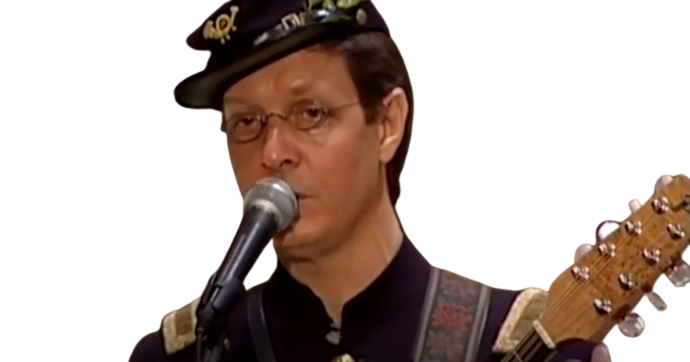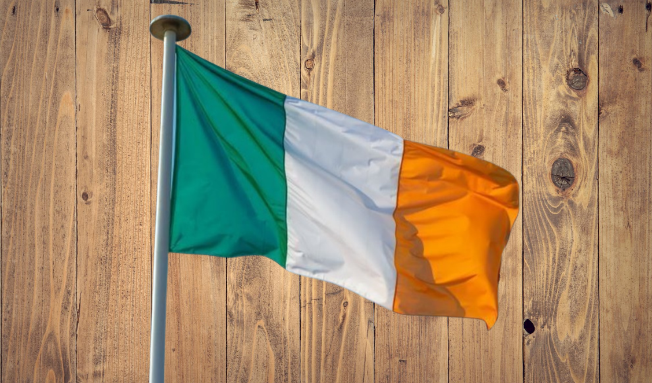The Irish Volunteer Lyrics And Guitar Chords
A traditional song recorded by Derek Warfield, also recorded by David Kincaid. The Irish Volunteer’ was recorded by Derek Warfield and featured on his third solo album ‘Sons of Erin’. The album focuses on the many Irish who fought and died on the Union side of the American Civil War. The melody of this song is ‘The Irish Jaunting Car’ a traditional Irish tune. The guitar chords are by Fintan Warfield. The Volunteer Song by the Donegal folk group Goats Don't Shave also had a song out called the Volunteer.
[G) Me name is Tim (C) McDonnell, I’m (G) from the Emerald (D) Isle,
(G) I was born in (C) Ireland’s bogs and (G) left when (D) but a (G) child.
Me father fought in (C) ’98, for (G) liberty so (D) dear;
He (G) fell upon old (C) Vinegar Hill, like an (G) Irish (D) volun(G)teer.
(G) Then raise the harp of (D) Erin, boys, the (C) flag we all (G) revere,
We’ll fight and fall (C) beneath the folds like (G) Irish (D) volun(G)teers!
(G) Then raise the harp of (D) Erin, boys, the (C) flag we all (G) revere,
We’ll fight and fall (C) beneath the folds like (G) Irish (D) volun(G)teers!
When I was driven from me home by an oppressor’s hand,
I cut me sticks and greased me brogues, came over to this land.
I found a home and many friends, and some that I love dear;
I’ll stick to them like bricks and glue says the Irish Volunteer.
Then raise the harp of Erin, boys, the flag we all revere,
We’ll fight and fall beneath the folds like Irish Volunteers!
Then raise the harp of Erin, boys, the flag we all revere,
We’ll fight and fall beneath the folds like Irish Volunteers!
Now when the traitors of the south commence their warlike raid,
I quickly laid down my hod, to the devil went me spade!
To a recruiting office I went, that happened to be near,
And joined the good old sixty-ninth like an Irish Volunteer.
Then fill the ranks, and march away! No traitor’s do we fear;
We’ll drive them all to blazes, says the Irish Volunteer.
Then fill the ranks, and march away! No traitor’s do we fear;
We’ll drive them all to blazes, says the Irish Volunteer.
When the Prince of Wales came o’er, and made a hullabaloo,
Oh, everybody was turned-out in gold and tinsel too;
But then the good old sixty-ninth they didn’t like lords or peers,
They wouldn’t give a damn for Kings, the Irish volunteers!
We love the land of liberty, it’s laws we will revere,
“But the devil take the nobility!” says the Irish volunteer.
We love the land of liberty, it’s laws we will revere,
“But the devil take the nobility!” says the Irish volunteer.
Now if the traitors in the south should ever cross our roads,
We’ll drive them all to blazes, as Saint Patrick did the toads,
Well give them all short nooses that come just below the ears
Made strong and good from Irish hemp, by Irish volunteers.
Then here’s to brave McClellan, whom the army now reveres,
He’ll lead us on to victory, say the Irish volunteers.
Then here’s to brave McClellan, whom the army now reveres,
He’ll lead us on to victory, say the Irish volunteers.
Now fill your glasses up, me boys, a toast come drink with me,
May Erin’s harp and Starry Flag united ever be;
May traitors quake, and rebels shake, and tremble in their fears,
When next we meet the Yankee boys, the Irish volunteers.
God bless the name of Washington, that name this land reveres,
Success to Meagher and Nugent and the Irish volunteers.
God bless the name of Washington, that name this land reveres,
Success to Meagher and Nugent and the Irish volunteers.
(G) I was born in (C) Ireland’s bogs and (G) left when (D) but a (G) child.
Me father fought in (C) ’98, for (G) liberty so (D) dear;
He (G) fell upon old (C) Vinegar Hill, like an (G) Irish (D) volun(G)teer.
(G) Then raise the harp of (D) Erin, boys, the (C) flag we all (G) revere,
We’ll fight and fall (C) beneath the folds like (G) Irish (D) volun(G)teers!
(G) Then raise the harp of (D) Erin, boys, the (C) flag we all (G) revere,
We’ll fight and fall (C) beneath the folds like (G) Irish (D) volun(G)teers!
When I was driven from me home by an oppressor’s hand,
I cut me sticks and greased me brogues, came over to this land.
I found a home and many friends, and some that I love dear;
I’ll stick to them like bricks and glue says the Irish Volunteer.
Then raise the harp of Erin, boys, the flag we all revere,
We’ll fight and fall beneath the folds like Irish Volunteers!
Then raise the harp of Erin, boys, the flag we all revere,
We’ll fight and fall beneath the folds like Irish Volunteers!
Now when the traitors of the south commence their warlike raid,
I quickly laid down my hod, to the devil went me spade!
To a recruiting office I went, that happened to be near,
And joined the good old sixty-ninth like an Irish Volunteer.
Then fill the ranks, and march away! No traitor’s do we fear;
We’ll drive them all to blazes, says the Irish Volunteer.
Then fill the ranks, and march away! No traitor’s do we fear;
We’ll drive them all to blazes, says the Irish Volunteer.
When the Prince of Wales came o’er, and made a hullabaloo,
Oh, everybody was turned-out in gold and tinsel too;
But then the good old sixty-ninth they didn’t like lords or peers,
They wouldn’t give a damn for Kings, the Irish volunteers!
We love the land of liberty, it’s laws we will revere,
“But the devil take the nobility!” says the Irish volunteer.
We love the land of liberty, it’s laws we will revere,
“But the devil take the nobility!” says the Irish volunteer.
Now if the traitors in the south should ever cross our roads,
We’ll drive them all to blazes, as Saint Patrick did the toads,
Well give them all short nooses that come just below the ears
Made strong and good from Irish hemp, by Irish volunteers.
Then here’s to brave McClellan, whom the army now reveres,
He’ll lead us on to victory, say the Irish volunteers.
Then here’s to brave McClellan, whom the army now reveres,
He’ll lead us on to victory, say the Irish volunteers.
Now fill your glasses up, me boys, a toast come drink with me,
May Erin’s harp and Starry Flag united ever be;
May traitors quake, and rebels shake, and tremble in their fears,
When next we meet the Yankee boys, the Irish volunteers.
God bless the name of Washington, that name this land reveres,
Success to Meagher and Nugent and the Irish volunteers.
God bless the name of Washington, that name this land reveres,
Success to Meagher and Nugent and the Irish volunteers.


